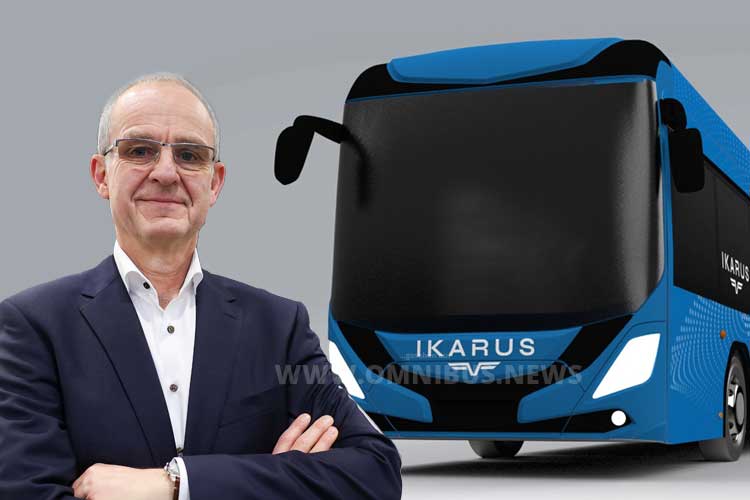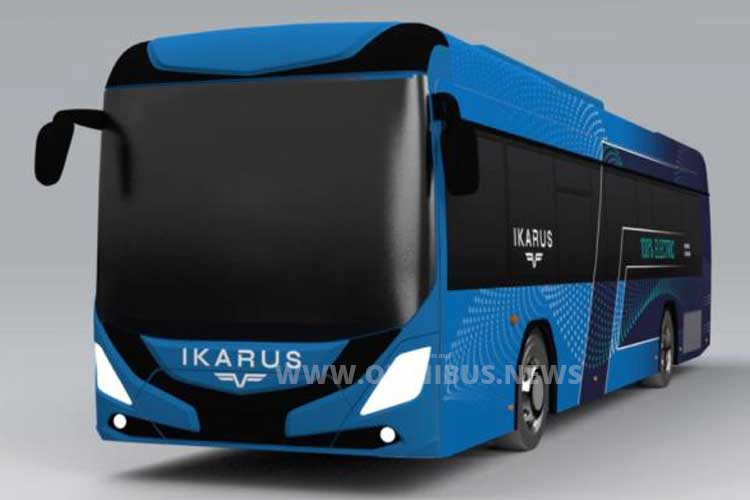
Zoltán Tankó, CEO von Ikarus Global Zrt., will expandieren und kündigt für die Busworld 2023 etwas Spannendes an. Foto: Ikarus, Montage: omnibus.news
Ikarus hat nicht nur den optischen Auftritt neugestaltet, sondern kündigt zur Busworld im Oktober 2023 die Premiere eines neuen Elektrobusses an. Die Designzeichnung, die Ikarus im Zusammenhang mit den ersten Informationen omnibus.news zur Verfügung gestellt hat, zeigt eine überarbeitete Frontmaske, die dem neuen Markenauftritt gerecht wird. Und auch das Heck sei überarbeitet worden, wie die Ungarn in diesem Zusammenhang mitteilen. Außerdem werde die neue Generation mit einem aktualisierten Fahrerarbeitsplatz vorfahren.
Bei den Batterien legen die Ungarn noch einmal nach: Der intern schlicht als 120e bezeichnete Elektrobus bekommt leistungsfähigere Batterien (Lithium-Nickel-Mangan-Kobalt-Oxid (NMC)). Diese haben eine höhere Energiedichte als die derzeit verwendeten Lithium-Eisen-Phosphat-Batterien (LFP) von CATL, die nach wie vor als Standard geliefert werden. Wer mehr Leistung möchte, kann die NMC-Akkus als Option gegen Aufpreis bestellen.
Zoltán Tankó, CEO von Ikarus Global Zrt., will expandieren und hat den Wettbewerb genau im Blick. Und für die Länder, die marktbedingt auf den klassischen Antrieb setzen – gemeint ist der Dieselmotor – wolle Ikarus auch Omnibusse mit Verbrennungsmotor anbieten. Wenn nötig, könnten diese nach Angaben des Geschäftsführers sogar lokal montiert werden. Wo das sein könnte, wollte Zoltán Tankó aber noch nicht sagen, für die Busworld wolle man noch den einen oder anderen Pfeil im Köcher haben.
Die Elektrobusse der ungarischen Marke kommen bei ihren Betreibern an, nicht nur in Ungarn, wo im letzten Jahr 17 Elektrobusse an verschiedene Verkehrsbetriebe verkauft wurden. Voller Stolz meldet Ikarus, dass die im letzten Jahr ausgelieferte Elektrobusse laut einem der Betreiber (auf Nachfrage wurde Volánbus genannt) im Januar diesen Jahres eine Verfügbarkeitsrate von 95 % hatte. Das sei ein hervorragendes Ergebnis für Elektrobusse im Winterbetrieb. Auch in Deutschland habe man erste Kunden für den Elektrobus 120e.
Die ersten Kundenfahrzeuge hätten, neben den Demo-Fahrzeugen, wichtige Rückmeldungen für die neue Generation geliefert, wie Ikarus erklärt. Mit der neuen Generation, die auch im Innenraum überarbeitet wurde, werde man in Brüssel eine elektrobus-Baureihe präsentieren, die sich im Vergleich mit dem Wettbewerb aus Europa nicht verstecken brauche. Außerdem werde man nicht nur einen Elektrobus anbieten, sondern potenziellen Kunden in Zusammenarbeit mit anderen Unternehmen aus dem hauseigenen Netzwerk der Unternehmensgruppe ein komplettes Paket anzubieten, das neben Ladegeräte auch Telematik- und Flottenmanagementsysteme umfasst. Der Elektrobus Ikarus 120e wird von Electrobus Europe Zrt. hergestellt, einem 2019 gegründeten Joint Venture zwischen Ikarus und dem chinesischen Unternehmen CRRC. (Ikarus/omnibus.news/Sr)

Ikarus announces a revised version of the 120e electric bus for Busworld. Photo: Ikarus
english version:
Ikarus has not only redesigned its visual appearance, but will also announce the premiere of a new electric bus at Busworld in October 2023. The design drawing, which Ikarus has made available to omnibus.news in connection with the initial information, shows a revised front mask that does justice to the new brand identity. And the rear end has also been revised, the Hungarians say in this context. In addition, the new generation will drive forward with an updated driver’s workplace.
And the Hungarians are also going one better with the batteries: The electric bus, known internally simply as the 120e, will get more powerful batteries (lithium-nickel-manganese-cobalt-oxide (NMC)). These have a higher energy density than the currently used lithium iron phosphate (LFP) batteries from CATL, which are still supplied as standard. Those who want more power can order the NMC batteries as an option at an additional cost.
Zoltán Tankó, CEO of Ikarus Global Zrt, wants to expand and has a close eye on the competition. And for those countries that, for market reasons, rely on the classic drive system – meaning the diesel engine – Ikarus also wants to offer buses with internal combustion engines, he says. If necessary, these could even be assembled locally, according to the managing director. However, Zoltán Tankó did not yet want to say where this might be; for Busworld, he said, the company still wants to have one or two arrows in its quiver.
The Hungarian brand’s electric buses are well received by their operators, and not only in Hungary, where 17 electric buses were sold to various transport companies last year. Full of pride, Ikarus reports that the electric buses delivered last year had an availability rate of 95% in January this year, according to one of the operators (Volánbus was named when asked). This is an excellent result for electric buses in winter operation, he said. In Germany, too, the first customers for the electric bus 120e have been found.
The first customer vehicles, in addition to the demo vehicles, have provided important feedback for the new generation, Ikarus explains. With the new generation, which has also been redesigned in the interior, an electric bus series will be presented in Brussels that does not need to hide in comparison with the competition from Europe. In addition, the company will not only be offering an electric bus, but will also be offering potential customers a complete package in cooperation with other companies from the group’s in-house network, including charging equipment as well as telematics and fleet management systems. The Ikarus 120e electric bus will be manufactured by Electrobus Europe Zrt, a joint venture established in 2019 between Ikarus and Chinese company CRRC. (Ikarus/omnibus.news/Sr)
